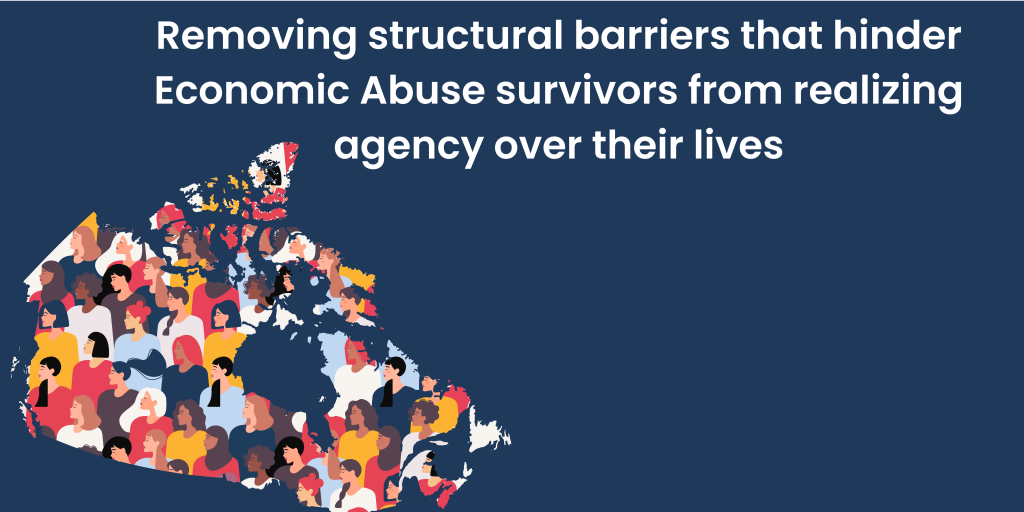WHY WE WANT TO ADDRESS ECONOMIC ABUSE
Championing financially strong futures for survivors
Economic Abuse is a key barrier to women leaving abusive relationships. It has a direct impact on a woman’s future, including housing security, as well as her ability to rebuild economic security and emotional well-being. Without access to money, women are unable to plan or even imagine leaving an abusive relationship. When women do leave an abusive relationship, they often experience temporary or unstable housing and are left with limited access to money, facing challenges to meeting their basic needs. Economic Abuse often continues after the relationship has ended.
In some cases, Economic Abuse worsens after separation. Abusers can use financial support systems, including spousal and child support orders, to maintain some financial control and manipulation.

1. Systemic and Policy Barrier:
- Economic abuse is a systemic barrier, but through financial inclusion efforts, implementing supportive policies, and fostering collaboration among stakeholders, we can create safer and more equitable financial systems that prioritize the protection and empowerment of all individuals, thereby preventing revictimization and promoting long-term recovery and economic stability.
- Discrimination, inequalities, economic exclusion, and systemic barriers, including racism and bias based on race, ethnicity, and sexual orientation, significantly obstruct access to economic resources, the justice system, custody battles, housing, banking, and employment. These pervasive obstacles disproportionately affect many BIPOC individuals, often forcing them back into the clutches of their abusers.
2.Nature of the Abuse
- Economic Abuse leads to long-term economic consequences for many women, mainly in the form of debt and damaged credit. These consequences can have a direct impact on a woman’s future including housing security as well as her ability to rebuild economic security.
- Economic Abuse, a pervasive yet often overlooked form of domestic violence, disproportionately impacts women, immigrants, refugees, indigenous, and gender-diverse individuals. Nearly all survivors of GBV experience Economic Abuse (94-99%).
- Economic Abuse is associated with depressive symptoms and other negative mental health outcomes (quality of life, PTSD), even after controlling for other forms of abuse.
- Women who experience Economic Abuse are 5x more likely to experience physical violence than those who don’t. Websdale, 1999
- Unlike physical abuse, Economic Abuse often continues long after a woman has left the abusive relationship because their abuser can maintain contact and control through spousal or child support. Coerced debt and bad credit scores often prevent survivors from securing housing in the short and long terms or make it more difficult to get a credit card, student loan, line of credit, car loan, and potentially a job due to screening by some employers. Economic barriers to leaving can mean women stay with abusive partners for longer and so experience more harm. Lack of economic security and access to resources post-separation are the primary reasons women return to an abusive partner. Financial abuse as a form of intimate partner violence in the Toronto area.
- Women who experience Economic Abuse alongside high levels of coercive control are at increased risk of being killed.
- Economic Abuse has a cascading effect on many aspects of women’s’ lives, including social supports, employment stability, emotional and psychological well-being. It’s Not All About the Money, 2017
3. Intersectionality
- Newcomer women are incredibly vulnerable because, without legal status in Canada, many financial supports are not available to them. This is the hardest situation to work with because there are systemic barriers that cannot be overcome easily and in a timely fashion. Financial abuse as a form of intimate partner violence in the Toronto area
4. Economic Inflation, Housing Shortages, and Soaring Food Costs
- The rising inflation, which is increasing the cost of living, coupled with the shortage of affordable and off-market housing options, escalating food prices, and overburdened assistance programs, can trap victims in a cycle of Economic Abuse, making them reluctant to leave.
5. The Prevalence of Gender Based Violence
- The prevalence and impact on intimate partner violence (IPV), as evidenced by the alarming rates across Ontario, with 70 municipalities declaring IPV an epidemic. This recognition underscores the urgent need to confront economic abuse, which exacerbates power imbalances, limits victims’ financial autonomy, and traps them in abusive relationships.
Economic Abuse In Canada
Read useful resources
Other resources
- Economic Abuse Power and Control
- What is Economic Abuse?
- Our six step check list to before you leave
- What should you do if you being financially abused?
- Learn more about Coerced Debt
- Find help across Canada


